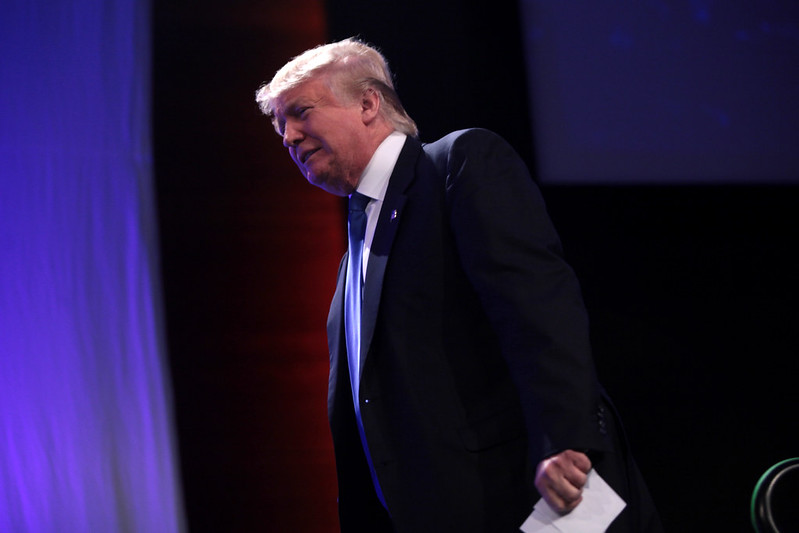News
Judge nixes some of Georgia’s charges against Trump and his allies − but that won’t necessarily derail the case

FILE: Former US President Donald Trump at the Iowa Events Center in Des Moines, Iowa. (Photo: Gage Skidmore/Flickr, CC BY-SA 2.0)
A Fulton County judge has tossed out six of the 41 state charges against Donald Trump and his allies in Georgia’s expansive election interference case against the former president and others.
Fulton County Superior Court Judge Scott McAfee issued a ruling on March 13, 2024, that focused on charges related to allegations that Trump and other defendants tried to get state officials to break the law and decertify the 2020 election results.
The ruling doesn’t mean that the entire case is derailed, explains Georgia election and legal scholar Anthony Michael Kreis. It’s a focused and technical ruling that says Georgia District Attorney Fani T. Willis has not specified which exact law the defendants are allegedly violating in some instances.
It also doesn’t have anything to do with the defense effort to disqualify Willis from the Trump case because of her romantic relationship with another prosecutor. An Atlanta-area judge is expected to soon rule on this issue.
Politics and society editor Amy Lieberman spoke with Kreis to better understand what’s behind this ruling and its implications for Georgia’s case against Trump and his allies.
What just happened with this ruling?
Essentially what we have here is a response to a legal motion on behalf of a number of defendants, including Trump. In that motion, Trump and his co-defendants say that the state did not give enough detailed particulars about the crimes that the defendants have been charged with and thus should be thrown out.
The set of charges revolve around the concept of a violation of an oath. That sprang up as a result of Trump’s phone call with Georgia Secretary of State Brad Raffensperger, with Trump asking him to “find” 11,780 votes that would have given Trump a win in Georgia. The charges also related to some of the defendants’ testimony before the state General Assembly, asking the Georgia Legislature to overturn the election and appoint their own electors.
The charges were based on a theory that these defendants unlawfully asked state officials to violate their oath and their duty to the constitutions of the United States and the state of Georgia. What wasn’t clear is what provisions they allegedly tried to induce state officials to violate.
In his ruling, the judge is saying that the state needs to go back to the grand jury and provide details of exactly what aspects of the Constitution these defendants allegedly tried to get state officials to violate, so the defendants have the ability to defend against these charges.
Is the judge saying there is not enough evidence to proceed with this case?
No. He’s saying that the state has not sufficiently explained how the evidence relates to an oath. For example, we know Rudy Giuliani went to the Georgia General Assembly with John Eastman and provided false information in order to encourage these state officials to overturn the election. The theory is that violated both the federal and state constitutions.
But a prosecutor could make that claim in a number of different ways. Did they violate the Georgia Constitution’s right to vote; did they violate the equal protection clause in the U.S. Constitution? Is it the right to vote that is spelled out in Georgia’s state Constitution? Or is there some other provision of federal or state law they violated? It’s just not clear.
The evidence supporting the charges is there. What is not there is the precise theory of the crime and the exact elements that support those indictments.
Did this decision surprise you?
No. This charge is kind of a unique charge. It is not something that people have really heard of in this context, particularly when it comes to state legislators and presidential electors. We are in an area of legal theory that is unique and without precedent. The judge is saying because we are in this new sphere of legal theory, the state really needs to be specific about what it is they are trying to prove here and what the nature of the criminality is.
The charge of violating an oath is just not something we see in the state of Georgia. The charges have been drafted in a very novel way, but they are responding to an unprecedented situation. We are in this kind of wild west of making law. And that is not necessarily a bad thing, but what it does require is a little greater attention to specifics. And the prosecutors have just not done that yet.
Could this delay the trial against Trump and his allies in Georgia?
Maybe. We will have to see. Willis can bring a new, more detailed indictment that is more in line with the state oath. I think if Willis brings another indictment on these charges, there probably won’t be a delay.
If she appeals this decision, rather than just seeking a new indictment, that might slow things down a little.
Is this a sign that the case is being derailed?
No. The entire indictment, except the violation of oaths of office, still stands. This makes work for the district attorney but is not a fatal detail. Willis can go back to constitutional law experts in her working group and hone in on the theory of a constitutional violation. And she will have another bite at the apple.![]()
Anthony Michael Kreis, Assistant Professor of Law, Georgia State University
This article is republished from The Conversation under a Creative Commons license. Read the original article.





















